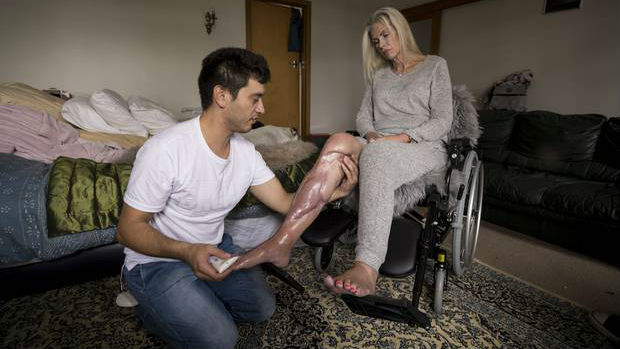She used to run marathons, now she can't take a step.
Josephine Ganley, 53, was "in perfect health" setting up her own marketing company before her life was turned upside down on August 15 last year.
She was at a set of traffic lights in West Auckland when she felt woozy. She couldn't drive and some nearby motorists called an ambulance. While she was waiting for help a man came over to her, said he was there to help and told her to get in the passenger's seat which she did.
The driver got into a police pursuit before crashing in New Lynn.
"I was just thinking 'I'm going to die and I'm not going to see Aaryn [my partner] again'.
"I don't know if we were spinning or tumbling, but I ended up on my neck with my leg out the door.
"The accident was so so bad. It was the most horrible thing you could ever imagine."
Ganley said it was an abduction.
A police spokesman said they followed up an initial allegation of kidnapping.
"However after speaking to parties involved, which included the victim as well as witnesses at the scene, police established there was no evidence to support that claim."
A 31-year-old was charged with dangerous driving causing injury, failing to stop for police, as well as driving while disqualified.

Josephine Ganley's partner Aaryn Paenga has been caring for her and her injuries since the accident last year. (Photo / Dean Purcell)
Ganley rattles off her injuries from the crash: "a 6cm tear to the oesophagus, two broken ribs, both arms broken, a tracheotomy, my chest wall was smashed, my lungs and bowel punctured, liver lacerated, left hip dislocated, pelvic floor shattered, sacrum smashed, my lower spine is all metal and both my legs were compound fractures".
"I used to do anything. I was running around like a blue arse fly. I loved life.
"Now I can't do anything."
After around 25 operations and almost eight months Ganley was released from hospital. She takes over 20 pills a day and intense pain is a daily occurrence.
Her right leg was due to be amputated two weeks ago as it is susceptible to infection but she asked to delay the surgery.
"My level of injury was so deep they didn't think I would make it.
"I was the 'unlikely miracle girl'."
Wheelchair-bound Ganley has struggled to get a Housing NZ home, despite being told she is high priority on the waitlist. She applied in September last year.
She went into emergency accommodation in March when she left hospital but her leg became infected and she had to return to hospital. Ganley does not want to return to emergency accommodation for fear of infection and her safety. She can't defend herself or run.
Her doctors and psychologists wrote a letter to Housing New Zealand outlining her high needs.
Ganley is currently staying at a friend's house in Onehunga. It is a temporary solution as her friend will need the space back and the house is on a hill, has steps up to the front door and is not fitted out for someone with mobility issues.
Ganley wants to live in central Auckland - close to her doctors and her support network of friends. Safety is also important to her.
"This is what my life is going to be like. People do what they want to do around me because I can't do anything. Life [since the accident] is miserable.
"I can't believe I'm sitting here in this. I've got pride in myself but you can't afford to have pride in yourself like this. I'm terrified."
Ministry of Social Development regional commissioner Mark Goldsmith said they were committed to finding a safe, secure place to stay for Ganley. She had been assessed and placed on the register since February at "A18" - one of the highest ratings a person can be given.
"We're working with Josephine and her agent about finding a house that suits her needs – which is a two or three-bedroom modified home, with wheelchair access, a wet shower and near to the hospital.
"This type of house is in high demand and there is low turnover, particularly in Auckland."
Goldsmith said nationally housing supply did not keep up with demand and they were working to increase the amount of public housing available.
Take your Radio, Podcasts and Music with you









